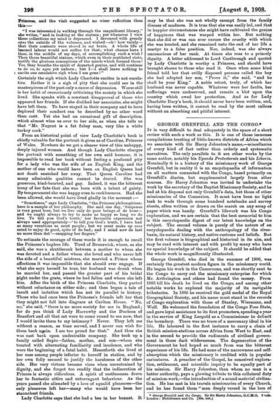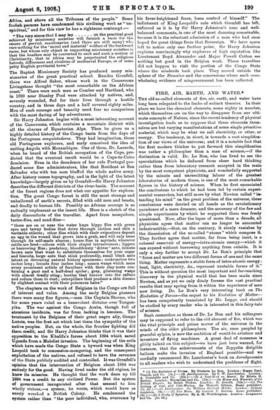GEORGE GRENFELL AND THE CONGO.* IT is very difficult to
deal adequately in the space of a short review with such a work as this. It is one of those immense compilations treating of little-known districts of Africa which we associate with Sir Harry Johnston's name,—miscellanies of every kind of fact rather than orderly and systematic narratives. The only parallels to it are other works by the same author, notably his Uganda Protectorate and his Liberia. Nominally it is a history of the missionary work of George Grenfell, but in reality it is an encyclopaedia of information on all matters connected with the Congo, based primarily on Grenfell's diaries, but supplemented largely from other sources. Sir Harry Johnston was invited to undertake the work by the secretary of the Baptist Missionary Society, and he had at his disposal not only Grenfell's data, but those of other missionaries of the Connexion. It must have been no light task to wade through some hundred notebooks and survey sheets, often written or drawn on the march on any scrap of paper which was handy. Grenfell's lifework was his Congo exploration, and we are certain that the best memorial to him is this encyclopaedic digest of our latest knowledge on the subject. The second volume is purely of the nature of an encyclopaedia dealing with the anthropology of the river- basin, its natural history, and native customs and beliefs. But the first volume is biographical and historical in its aim, and may be read with interest and with profit by many who have no special knowledge of the subject. It should be added that the whole work is magnificently illustrated.
George Grenfell, who died in the summer of 1906, was certainly the greatest modern figure in the missionary world. He began his work in the Cameroons, and was shortly sent to the Congo to carry out the missionary enterprise for which Mr. Arthrington and others had found the money. From 1883 till his death he lived on the Congo, and among other notable works he explored the majority of its navigable tributaries. In 1886 he received the gold medal of the Royal Geographical Society, and his name must stand in the records of Congo exploration with those of Stanley, Wissmann, and Wolf. He welcomed the foundation of the Congo Free State, and gave loyal assistance to its first promoters, spending a year in the service of King Leopold as a Commissioner to delimit the boundary. There was no trace of a mercenary ideal in his life. He laboured in the first instance to carry a chain of British mission-stations across Africa from West to East, and in the second to provide the rudiments of civilised govern- ment in those dark wildernesses. The degeneration of the Government he had hoped so much from was the bitterest experience of his life. He had none of the narrowness and self- absorption which the missionary is credited with in popular caricatures. A preacher of the Gospel, he conceived explora- tion, settlement, and scientific inquiry to be equally part of his mission. Sir Harry Johnston, than whom no man is a better authority, pays a glowing tribute to this collateral duty of raission-work,—the introduction of a sound material civilisa- tion. He has met in his travels missionaries of every Church, and he has found them "men deeply versed in the lore of * George Eivenjell and The Congo. By Sir parry Johnston, G.C.K.G. 2 vols. London : Hutchinson and Co. [80s. net. j
Africa, and above all the Tribunes of the people." Some foolish persons have condemned this civilising work as " un- spiritual," and for this view he has a righteous contempt
;- u The very stress that I may lay . . . on the practical good achieved by missionary societies will furnish a. basis for the sneers of peevish reactionaries (and there are still many) who care nothing for the moral and material' welfare of the backward races, but whose only object in supporting missionary societies is that the heathen may be converted to such and such a section of Christianity, that in Africa may be perpetuated the religious hatreds, differences and rivalries of mediaeval Europe, or of some petty English provincial town."
The Baptist Missionary Society has produced many mis- sionaries of the great practical school. Besides Grenfell, there was Alfred Saker, whose work in the Cameroons Livingstone thought "the most remarkable on the African coast." There were such men as Comber and Hartland, who in 1880 near Stanley Pool were attacked by natives, and, severely wounded, fled for their lives through a hostile country, and in three days and a half covered eighty miles. Men of such courage and tenacity need fear no comparison with the most daring of lay adventurers.
Sir Harry Johnston begins with a most interesting account of the Cameroons, which contains a mountain district with all the charms of Equatorian Alps. Then he gives us a highly detailed history of the Congo basin from the days of the Portuguese conquistadores. They had imagination, those old Portuguese explorers, and early conceived the idea of uniting Angola with Mozambique. One of them, Dr. Lacerda, when be beard of the British occupation of the Cape, pre- dicted that the eventual result would be a Cape-to-Cairo dominion. Even in the decadence of her rule Portugal pro- duced some fine administrators, like that Resident at San Salvador who with ten men bluffed the whole native army.
• After history comes topography, and in the light of the latest knowledge—largely given us by Grenfell—Sir Harry Johnston describes the different districts of the river-basin. The account of the forest regions does not whet our appetite for explora- tion. The great Congo forest is still the most strange and • unhallowed of earth's secrets, filled with odd men and beasts, and deadly to human life. Possibly no African scourge is so radically unpleasant as the insect life. Here is a sketch of the daily discomforts of the traveller. Apart from mosquitoes, tsetse-flies, and sand-flies-
" there are on or near the water huge hippo flies with green eyes and tawny bodies that drive through clothes and skin a veritable stiletto; other flies which with their ovipositors deposit an egg in the wound that grows into a grub, and will only issue through its self-made abscess ; house flies in myriads, wherever cattle are bred—odious with their stupid intrusiveness ; jiggers or burrowing flies; predatory, bloodthirsty 'driver' ants, minute brown ants that want to substitute themselves for your sugar and biscuits, large ants that stink profoundly, small black ants intent on devouring natural history specimens ; cockroaches two inches long ; locusts four inches long ; mason wasps which mess every prominent article of furniture with their clay nests con- taining a gnat and a half-dead spider; grey, glistening wasps with almost deadly sting ; beetles that burrow into the rafters and reduce them to dust ; caterpillars that produce a skin disease by slightest contact with their poisonous hairs."
The chapters on the work of Belgians in the Congo are full of interest and value. Among the early Belgian pioneers there were many fine figures,—men like Captain Storms, who for some years ruled as a benevolent dictator over Tangan- yika. The war against the Congo Arabs, though full of atrocious incidents, was far from lacking in heroism. The treatment by the Belgians of their great negro ally, Gongo Lutete, was the first act which lost them the sympathy of the native peoples. But, on the whole, the frontier fighting did them credit, and Sir Harry Johnston thinks that it was their opposition to the Khalifa's forces about 1894 which saved Uganda from a Mandist invasion. The beginning of the evils which have made the Congo State a byword was when King Leopold took to concession-mongering, and the consequent exploitation of the natives, and refused to have the revenues of the State publicly audited and controlled. It was Grenfell's opinion that the intervention of Belgium about 1884 was entirely for the good. Having lived under the old regime, he knew its miseries. He thought that the work done up till 1894 was a credit to any civilised Power. But the system of government inaugurated after that seemed to him wholly vicious,—a system, he wrote, which would have as surely wrecked a British Colony. He condemned the 8/Elterc rather than "the poor individual, who, overcome by his fever-heightened fears, loses control of himself." The indictment of King Leopold's rule which Grenfell has left, enforced as it is by Sir Harry Johnston's sane and well- balanced comments, is one of the most damning conceivable, because it is the reluctant admission of a man who had once hoped for great things from that Sovereign. We have space left to notice only one further point.. Sir Harry Johnston explains convincingly why explorers of high reputation like Lieutenant Boyd Alexander and Major Powell Cotton see nothing but good in the Belgian work. These travellers did not happen to visit the portion of the Congo State where the misdeeds took place. They moved outside the sphere of the Donzaine and the concessions where such over- whelming evidence of misgovernment has been collected.



































 Previous page
Previous page